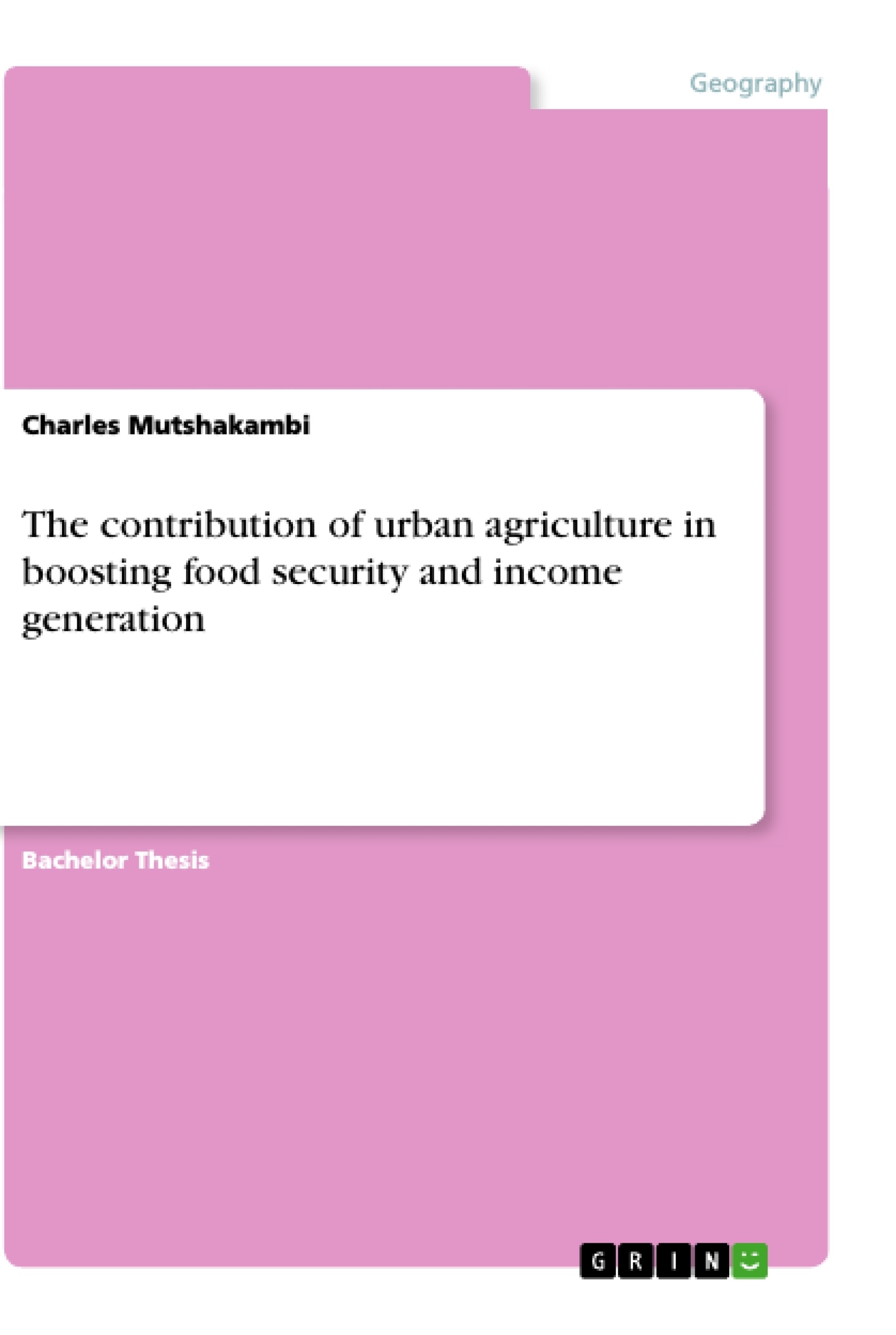This study highlights the extent to which urban agriculture (UA) enhances food security and income generation in Ward 21 of Bulawayo in Zimbabwe against the challenges faced by the local residents where very little researches have been conducted and the data is still scarce. The expectation of this research is to benefit every stakeholder concerned about reducing food insecurity through the implementation of various urban agricultural activities. This is due to the fact that the study sought to give detailed information about the several agricultural activities in urban areas and how they help in improving the food security status and income generation to urban dwellers. Therefore all the stakeholders initiating programs mainly to reduce vulnerability of urban residence for instance NGO’s require the information in determining the types of projects to execute in those areas.
UA has increasingly become a popular practice and is widely perceived to be the panacea to urban livelihood challenges. Urban households have been affected by high costs of basic food staffs and high levels of unemployment in Zimbabwe. The closure of industries and the economic meltdown from year 2000 to date has left many people jobless and with less disposable incomes in most parts of Zimbabwe. The residents of Ward 21 in Bulawayo have not been spared from these challenges of unemployment and food insecurity. According to World Bank (2015), most of the workers in Zimbabwe have salaries which fall below the poverty datum line and this has severe impacts to the workers in achieving food security.
Poverty has impoverished most households in ward 21 which has left some households only having one meal a days. More so, the situation is further exacerbated by the retrenchment of workers by major companies in Bulawayo such as, Delta Beverages, Monarch and NRZ. These challenges have been further aggravated by the massive exodus of people from rural areas into urban areas .Hence given the above, achieving food security has become a problematic issue for the people residing in Ward 21.
Inhaltsverzeichnis (Table of Contents)
- DEDICATION
- ACKNOWLEDGEMENTS
- ABSTRACT
- TABLE OF CONTENTS
- List of figures
- List of tables
- List of plates
- ACRONYMS
- CHAPTER ONE: INTRODUCTION
- 1.1 Background of the study
- 1.2 Statement of the problem
- 1.3 Objectives of the study
- 1.3.1 General objective
- 1.3.2 Specific objectives
- 1.4 Justification
- 1.5 Study area
- CHAPTER TWO: LITERATURE REVIEW
- 2.1 Food Security
- 2.2 Overview of Food Security in Zimbabwe
- 2.4 Overview of Urban Agriculture
- 2.6 How UA influence household food security using the Household Food Insecurity Access Scale (HFIAS)
- 2.6.1 Methods of measuring household food security
- 2.6.2 Household Food Insecurity Access Scale (HFIAS)
- 2.7 Legislation governing the practice of UA in Zimbabwe
- 2.7.1 The Urban Councils Act, Chapter 29:15
- 2.7.2 Regional Town and Country Planning Act, Chapter 29:12
- 2.7.3 Environmental Management, Act Chapter 20:27
- 2.7.4 The Forest Act Chapter, 19:05
- 2.8 Challenges faced in UA
Zielsetzung und Themenschwerpunkte (Objectives and Key Themes)
This dissertation investigates the contribution of urban agriculture (UA) on household food security and income generation in Ward 21 of Bulawayo, Zimbabwe. The study utilizes both qualitative and quantitative research methodologies, including questionnaires, key informant interviews, and secondary data analysis.
- Impact of UA on Household Food Security
- Role of UA in Income Generation
- Challenges Faced by Urban Farmers
- Urban Agriculture and Food Security in Zimbabwe
- Policy Implications for Sustainable Urban Agriculture
Zusammenfassung der Kapitel (Chapter Summaries)
- Chapter One: Introduction
- Chapter Two: Literature Review
This chapter sets the context for the research by outlining the background, statement of the problem, objectives, justification, and study area. It highlights the importance of UA in addressing food insecurity and income generation in urban areas.
This chapter provides a comprehensive overview of the existing literature on food security, urban agriculture, and its impact on households. It explores various aspects of UA, including its methods, benefits, challenges, and relevant legislation.
Schlüsselwörter (Keywords)
Urban agriculture, household food security, income generation, Ward 21 Bulawayo, Zimbabwe, food insecurity, HFIAS, urban farming, challenges, policy implications.
Frequently Asked Questions
How does urban agriculture improve food security in Bulawayo?
Urban agriculture (UA) provides households with direct access to fresh produce, reducing the number of missed meals and lowering reliance on expensive basic food items in a volatile economy.
Can urban farming generate income for residents in Zimbabwe?
Yes, many residents in Ward 21 sell surplus crops to neighbors or local markets, providing a vital source of disposable income in a region with high unemployment rates.
What are the main challenges faced by urban farmers in Bulawayo?
Key challenges include limited access to land, lack of water resources, restrictive urban bylaws, and a lack of technical support or funding from NGOs and government bodies.
What is the Household Food Insecurity Access Scale (HFIAS)?
The HFIAS is a method used to measure the degree of food insecurity within a household over a specific period, focusing on access and anxiety regarding food supply.
Why has urban agriculture become popular in Zimbabwe since 2000?
The economic meltdown, industrial closures, and massive urban migration have left many jobless. UA has become a "panacea" or survival strategy for urban dwellers to cope with poverty.
- Citation du texte
- Charles Mutshakambi (Auteur), 2018, The contribution of urban agriculture in boosting food security and income generation, Munich, GRIN Verlag, https://www.grin.com/document/498772



